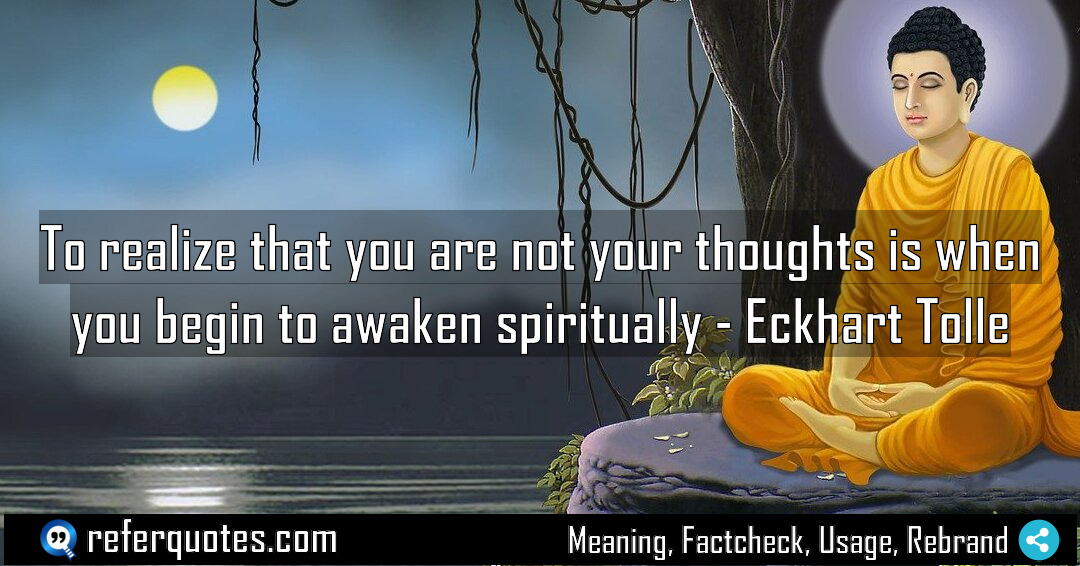
To realize that you are not your thoughts… that’s the single most important shift in spiritual awakening. It’s the moment you stop being a slave to the endless chatter in your head and start discovering the real you, the conscious presence behind it all.
Share Image Quote:
Table of Contents
Meaning
The core message is that your true identity isn’t the stream of thoughts in your head, but the awareness that observes them.
Explanation
Okay, let me break this down because it’s a game-changer. For most of our lives, we’re completely identified with our thinking. A negative thought arises, and we become that negativity. An anxious thought pops up, and we’re consumed by the anxiety. We are the thinker, and the thoughts are us. It’s a total fusion. But what Tolle is pointing to is the moment of dis-identification. It’s the subtle but profound shift where you notice a thought, and instead of getting swept away by it, you simply witness it. You realize, “Oh, there is a thought.” And in that tiny gap of awareness, you find yourself. Not the thought, but the space in which the thought is happening. That space is pure consciousness. That’s the beginning of the end of your suffering, honestly.
Quote Summary
Reading Level80
Aesthetic Score86
Origin & Factcheck
This insight comes straight from Eckhart Tolle’s 1997 book, The Power of Now. It was first published in Canada and became a foundational text of modern spirituality. You won’t find this exact phrasing attributed to anyone else—this is pure Tolle, crystallizing a ancient wisdom teaching for a contemporary audience.
Attribution Summary
Author Bio
Eckhart Tolle, born in Germany in 1948, became widely known after his transformative insights at age 29 led him to teach about presence and inner stillness. He later settled in Vancouver and wrote The Power of Now and A New Earth, which topped bestseller lists and inspired millions. He collaborates with major platforms, hosts retreats, and shares teachings through his online portal. The also includes Stillness Speaks and Guardians of Being. He writes in a clear, compassionate voice that invites practical practice in everyday life.
| Official Website | Facebook | X| Instagram | YouTube
Where is this quotation located?
| Quotation | To realize that you are not your thoughts is when you begin to awaken spiritually |
| Book Details | Publication Year/Date: 1997; ISBN: 978-1577314806; Last Edition: New World Library Edition (2004); Number of Pages: 229 |
| Where is it? | Chapter 1: You Are Not Your Mind, Page 20 |
Context
In the book, this realization is the entire foundation. Tolle describes his own transformation, which began when he hit an extreme low and thought, “I cannot live with myself any longer.” In that moment, he had a sudden awakening to the distinction between “I” and the “self” he couldn’t live with. The book is essentially a guide to recreating that shift, to stepping out of the “pain-body” of your conditioned mind and into the freedom of the Now.
Usage Examples
So how do you actually use this? It’s a practice, not just an idea.
- For the Overthinker: When you’re spiraling in anxiety about a work project, pause and literally say to yourself, “I am having the thought that this will fail.” This creates instant distance between you and the doom-scenario.
- For Someone in Conflict: When you feel anger towards someone, notice the angry thoughts as mental events passing through. This doesn’t mean you don’t set boundaries, but you respond from a place of clarity, not from being possessed by the anger.
- For Daily Mindfulness: Just sit for two minutes and watch your thoughts like clouds drifting across the sky. Don’t judge them, don’t follow them. Just notice. You are the sky, not the clouds.
To whom it appeals?
Share This Quote Image & Motivate
Motivation Score84
Popularity Score90
Shareability Score91
FAQ
Question: If I’m not my thoughts, then who am I?
Answer: That’s the million-dollar question that can only be discovered experientially. You are the conscious awareness, the silent witness, the space in which all thoughts, feelings, and sensations appear. It’s a felt sense of being, prior to any label or story.
Question: Does this mean I should stop thinking?
Answer: Not at all! Functional thinking is a brilliant tool. The goal isn’t to empty the mind, but to break your addiction to thinking. You use thought when you need it, instead of it using you 24/7.
Question: This sounds passive. Won’t I become apathetic?
Answer: It’s the opposite. When you’re not drained by constant mental drama, you have more energy for effective, purposeful action. You act from a place of inner peace, not reactivity, which is far more powerful.
Question: How long does it take to “get” this?
Answer: It’s not a one-time achievement but a moment-to-moment practice. Sometimes you’ll feel it clearly, other times you’ll be lost in thought again. The “awakening” is simply the commitment to returning to that awareness, again and again.
Similar Quotes
Our thoughts make us what we are is a powerful truth I’ve seen play out time and again. It’s not just positive thinking; it’s about the architecture of your reality.…
To observe the mind is to begin to free yourself from its constant chatter. It’s the first, crucial step in realizing you are not your thoughts, and that simple shift…
To be aware of a thought is already to be free from it. It sounds simple, but this is the entire game of mindfulness right there. It’s the difference between…
To be identified with your mind is a trap that keeps you locked in the past and future. It’s the reason we’re so often stressed, replaying old stories or anxiously…
You know, that idea that “Nothing can come into your experience unless you summon it” is a powerful one. It really puts you in the driver’s seat of your own…
